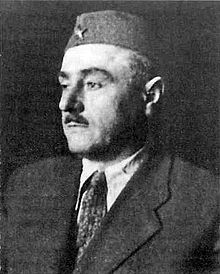Andrija Hebrang (father)
| Andrija Hebrang | |
|---|---|

Andrija Hebrang wearing a Partisan cap
|
|
| 4th Secretary of the Communist Party of Croatia |
|
|
In office 1942 – October 1944 |
|
| President | Vladimir Nazor(1943 on) |
| Preceded by | Vlado Popović |
| Succeeded by | Vladimir Bakarić |
| Personal details | |
| Born |
22 October 1899 Bačevac, Croatia-Slavonia, Austria-Hungary |
| Died | 1949 Maruševec, Yugoslavia |
| Political party | Communist Party of Yugoslavia (KPJ) |
| Spouse(s) | Olga Hebrang (née Strauss) |
| Children |
Andrija Hebrang Branko Hebrang Dunja Hebrang |
| Occupation | Politician |
Andrija Hebrang (22 October 1899 – c. 1949) was a Croatian and Yugoslav communist politician. A member of the Communist Party of Yugoslavia until his dismissal, he served as the 4th Secretary of the Central Committee of the Communist Party of Croatia.
Andrija Hebrang was born in Bačevac (part of Gradina) to Andrija Hebrang and Cela Strasser. In World War I, he was stationed in Osijek, Zagreb, and finally the battlefields in Gorizia, Italy where he stayed until the end of the war. Not long afterward, in 1919, he joined the Communist Party of Yugoslavia and became heavily involved in socialist political causes.
In 1923, Hebrang moved to Zagreb. He was arrested in 1924 for his involvement in protests for trade union rights. By the late 1920s, Hebrang had risen to high ranks in the Communist Party and was several times arrested and jailed for his various activities. It was during this time that he became acquainted with Josip Broz Tito. In early 1928, along with several other communists, Hebrang was arrested for communist activities, and was sentenced in Belgrade to 12 years imprisonment and hard labor in Lepoglava and Sremska Mitrovica prisons. In March 1941, shortly after his release from prison, he became a member of the Central Committee of the Communist Party of Croatia.
In 1942, he was captured by the Ustaše and sent to Stara Gradiška concentration camp, where he was later exchanged along with his future wife, Olga, for several Ustasha officials. He traveled to Bihać to attend the Anti-fascist Council of the National Liberation of Yugoslavia (AVNOJ). He also helped form the State Antifascist Council of the National Liberation of Croatia (ZAVNOH) and served as the vice-president. On 20 September 1943, ZAVNOH unilaterally issued a declaration that Istria, Rijeka, and Italian-occupied Dalmatia were part of Croatia without the prior approval of the national AVNOJ. which angered Yugoslav leader Tito.
...
Wikipedia
